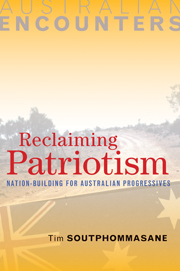Book contents
3 - Citizenship and multiculturalism
Published online by Cambridge University Press: 05 May 2010
Summary
On an autumn morning in Sydney in late April, as I sat in a eucalyptus grove on the school grounds, I listened as one of my fellow students delivered an oration in remembrance of those who fought and died for our country. It remains one of the enduring memories of my time at high school. We took our patriotism and the business of Anzac pretty seriously at Hurlstone Agricultural High. Our school motto was Pro Patria (For My Country), as in Horace's exhortation of Dulce et decorum est pro patria mori (‘It is sweet and right to die for one's country’). Our most celebrated old boy was John Hurst Edmondson VC, whose gallantry during a bayonet charge at Tobruk in 1941 earned him a posthumous Victoria Cross. Our principal and head teacher would, at school assemblies, make the whole school repeat the singing of the national anthem until they felt it was sung with the requisite gusto.
Yet there was something about that Anzac ceremony that did not seem quite right. There was something strange about how my schoolmate spoke about the Anzac spirit, about how ‘our forebears’ fought to defend ‘our country’ and ‘the Australian way of life’. They were noble sentiments, that I cannot deny. There was just something incongruous about having this particular student delivering them. After all, she was someone like me: distinctly Asian, even if like me she had an unmistakable Australian twang.
- Type
- Chapter
- Information
- Reclaiming PatriotismNation-Building for Australian Progressives, pp. 62 - 88Publisher: Cambridge University PressPrint publication year: 2009



